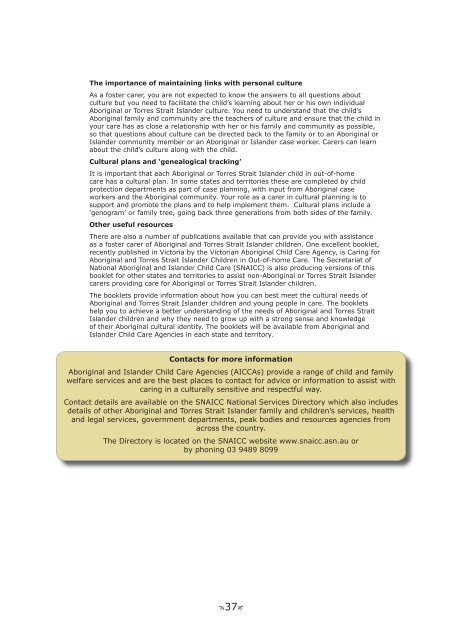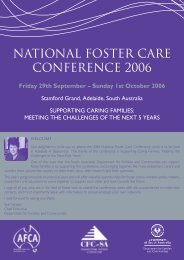Aboriginal and Torres StraitIslander children in careSecretariat of National Aboriginal and Islander Child CareAboriginal and Torres Strait Islander children are significantlyover-represented in child protection and out-of-home carestatistics in Australia. At 30 June 2005, there were 5,678Aboriginal and Torres Strait Islander children in out-of-homecare, an increase of 619 since 30 June 2004. The rate ofAboriginal and Torres Strait Islander children in out-of-homecare in Australia at 30 June 2005 was 26.4 per 1,000 childrenaged 0 to 17 years, and on a state-by-state basis this rangedfrom 8.9 per 1,000 children in the Northern Territory to 40.7 per1,000 children in Victoria.In all states and territories, there are higher rates of Aboriginaland Torres Strait Islander children in out-of-home care thanother children. The national rate of Indigenous children inout-of-home care was over six times the rate for other children.On a state-by-state basis, the rate of Aboriginal and TorresStrait Islander children in out-of-home care ranges betweennearly nine and 13 times the rate for other children.As well as being more likely to be placed into out-of-homecare, Aboriginal and Torres Strait Islander children are likely toremain in care longer. In Victoria, for example, an Aboriginalchild or young person stays four times longer in out-of-homecare than a non-Aboriginal child. The average length of stay is239 days compared with 62 days.These large numbers of Aboriginal or Torres Strait Islanderchildren in out-of-home care are a consequence of a 200-year history of landdispossession and destroyed livelihoods, families, communities, language and culture.In turn, these have caused economic, psychological and spiritual/cultural devastation.Aboriginal and Torres Strait Islander children today enter the care system because theirfamilies are still suffering from grief and loss, stress, poor physical and mental health,substance abuse, and violence.Understanding the Aboriginal familyTraditional Aboriginal family practices provide very strict laws for people to live by. Thekeeping of these laws provides the family group with a strong sense of cultural identityand belonging.There are a number of skin groups within language groups and all Aboriginal peopleare born with a skin name. Skin groups govern social behaviours and interaction,traditionally determining those they can trade with, marry, and so on.Traditionally a clan consists of two or more family groups that share an area of landover which they have ownership. Clan boundaries are passed from one generation tothe next, generally through the father.Aboriginal and Torres Strait Islander people’s relationship with the land is different tothat of other <strong>Australian</strong>s. Aboriginal people have a deep spiritual connection with theland. ‘The best way to allow spirituality to emerge in Aboriginal children is to allow themto experience it — to feel connection with people and places — and feel proud.’Aboriginal Child Placement PrincipleThe Aboriginal Child Placement Principle outlines a preference for the placement ofAboriginal and Torres Strait Islander children with other Aboriginal and Torres StraitIslander people when they are placed outside their family (Lock 1997:50).The principle has the following order of preference for the placement of Aboriginal andTorres Strait Islander children:• with the child’s extended family• within the child’s Indigenous community• with other Indigenous people.The <strong>Australian</strong> Government and all the states and territories have adopted theAboriginal Child Placement Principle either in legislation or policy. The impact of theprinciple is reflected in the relatively high proportions of Aboriginal and Torres StraitIslander children who are placed either with Indigenous care givers or with relativesthroughout Australia.36
The importance of maintaining links with personal cultureAs a foster carer, you are not expected to know the answers to all questions aboutculture but you need to facilitate the child’s learning about her or his own individualAboriginal or Torres Strait Islander culture. You need to understand that the child’sAboriginal family and community are the teachers of culture and ensure that the child inyour care has as close a relationship with her or his family and community as possible,so that questions about culture can be directed back to the family or to an Aboriginal orIslander community member or an Aboriginal or Islander case worker. <strong>Carers</strong> can learnabout the child’s culture along with the child.Cultural plans and ‘ genealogical tracking’It is important that each Aboriginal or Torres Strait Islander child in out-of-homecare has a cultural plan. In some states and territories these are completed by childprotection departments as part of case planning, with input from Aboriginal caseworkers and the Aboriginal community. Your role as a carer in cultural planning is tosupport and promote the plans and to help implement them. Cultural plans include a‘genogram’ or family tree, going back three generations from both sides of the family.<strong>Other</strong> useful resourcesThere are also a number of publications available that can provide you with assistanceas a foster carer of Aboriginal and Torres Strait Islander children. One excellent booklet,recently published in Victoria by the Victorian Aboriginal Child Care Agency, is Caring forAboriginal and Torres Strait Islander <strong>Children</strong> in Out-of-home Care. The Secretariat ofNational Aboriginal and Islander Child Care (SNAICC) is also producing versions of thisbooklet for other states and territories to assist non-Aboriginal or Torres Strait Islandercarers providing care for Aboriginal or Torres Strait Islander children.The booklets provide information about how you can best meet the cultural needs ofAboriginal and Torres Strait Islander children and young people in care. The bookletshelp you to achieve a better understanding of the needs of Aboriginal and Torres StraitIslander children and why they need to grow up with a strong sense and knowledgeof their Aboriginal cultural identity. The booklets will be available from Aboriginal andIslander Child Care Agencies in each state and territory.Contacts for more informationAboriginal and Islander Child Care Agencies (AICCAs) provide a range of child and familywelfare services and are the best places to contact for advice or information to assist withcaring in a culturally sensitive and respectful way.Contact details are available on the SNAICC National Services Directory which also includesdetails of other Aboriginal and Torres Strait Islander family and children’s services, healthand legal services, government departments, peak bodies and resources agencies fromacross the country.The Directory is located on the SNAICC website www.snaicc.asn.au orby phoning 03 9489 809937



